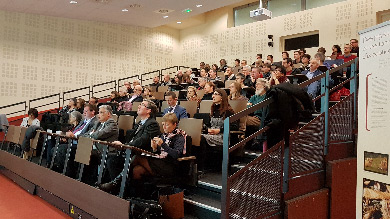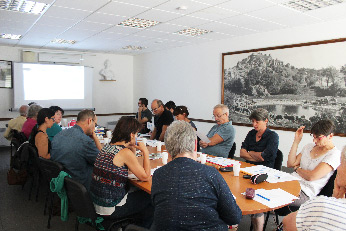Causses & Cévennes, France

Causses & Cévennes, France
Causses & Cévennes, France, is a designated Unesco World Heritage Site. The site encompasses open landscape and dolines, grassland steppe type cover on a karst plateau, high-altitude grass and moorlands, peat soils and wetlands on a granite substrate.
Farming systems are dominated by livestock production and extensive agro-sylvo-pastoralism of sheep and goats. Transhumance endures in the region.
The key issues are management of the cultural landscape allowing for its resilience and transformations, patrimony and rural sustainable development, and sustainable livestock production. The area’s strengths are in its advocacy work towards the national government and the EU in favour of extensive livestock systems, coordination of multiple layers of territorial authorities and sectorial competences, and control of predators.
For more information on the HNV farming systems, challenges and innovations, see the innovations page of Causses & Cévennes.
More info: whc.unesco.org/en/list/1153
Contact person:
Participatory approach
The HNV-Link project in Causses and Cevennes, France, is led by a close partnership between CEN L-R (local conservatory of nature reserves), the Interdepartmental Organisation for the Causses and Cevennes, and the Regional Chamber of Agriculture of Occitanie Region. These organisations are used to working together through different structural projects (e.g. Mil’Ouv LIFE+ project finished in December 2017). The partnership integrates the numerous existing actions already carried out by the partners on the territory and organises regular meetings within the partnership.

2016 territorial conference
Since 2016, the partners for Causses and Cevennes Learning Area (LA) have adopted a participatory approach to implement the HNV-Link project and to foster stakeholders’ adoption of the concept of high nature value (HNV) farming, which is little used in in the Causses and Cevennes or France generally. The partners have lead a process to build together a baseline assessment for the Causses and the Cevennes and to identify implemented innovations and innovation needs in the local context.
Specific activities as part of the participatory approach used by the partners for the above goals include: informal bilateral meetings, group discussions, and workshops. In addition, outreach has aimed to share the concept and activities with the public. For instance, the network of the Interdepartmental Organization of the Causses and Cévennes has been used to inform local stakeholders and collect their perceptions and expectations for the area’s future. The concept of HNV farming and the project were also taken up during the International Encounters of practitioners of Mediterranean agro-silvo-pastoralism (October, 17th-20th of 2017).

2017 innovation seminar
Partners developed the baseline assessment of the learning area through evaluation of the general context for the area, the agro-pastoral systems, the current socio-political dynamics and the historical foundations. Partners also applied a prospective approach dealing with consequences of a business-as-usual scenario. To complete the baseline assessment and to formulate the Vision for the LA, the team reviewed literature, official reports and recent programmes or projects results (e.g., Mil'Ouv, Pegasus), after which the team consulted with various stakeholders and experts involved in natural areas management (Cevennes National Park, Grands Causses Regional Nature Park, etc.). Following these consultations, partners established a working group (10 participants) on February 21, 2017. Thanks to the mobilization of project leaders and other partners’ skills (for instance, involvement of Cevennes National Park architect-landscaper to elaborate upon sections of territorial subunits), the baseline assessment was finalised in August 2017. The document is being distributed to contributors and concerned stakeholders.
An Innovation seminar aimed at the identification of existing innovations in the region and innovation needs took place with local stakeholders (20 participants from 17 organisations) on July 13, 2017. It facilitated validation of identified issues and sharing of innovations for the territory. These elements need now to be really adopted by local actors.
Table 1: List of participatory events in LA Causses and Cevennes, France (up to April 2018)
| Activities | Number of participants | Date |
|---|---|---|
| Causses and Cevennes Territorial Conference | 60 | Dec 2016 |
| Local workshop on baseline assessment | 10 | Feb 2017 |
| Interviews with key stakeholders | 15 | May 2017 |
| Innovation seminar | 20 | Jul 2017 |
| International Encounters of practitioners of Mediterranean agro-silvo-pastoralism (RIAAM) | 180 | Oct 2017 |
| Causses and Cevennes Territorial Conference | 40 | Dec 2017 |
| Presenting the project at the Forum on Alternative Agricultural Practices, looking for new partnerships (LIFE+ Alpilles) | 50 | April 2018 |
Slideshow
Disclaimer: This document reflects the author's view and the Research Executive Agency is not responsible for any use that may be made of the information it contains.
Outputs
-
 Causses & Cévennes, France LA
Causses & Cévennes, France LA
- Baseline Assessment
- Report from the Innovation seminar
- Presentation Innovation seminar
- Innovation report
- Participatory approach Causses & Cévennes
- Causses & Cévennes, France, HNV-Link Final Conference (Poster)
- Action Plan
(April, 2019)The compilations of the respective reports from all project learning areas - Baseline Assessments, Reports from innovation seminars, and Compendium of Innovation - can be found in 'Outputs'. Reports from the Innovation seminars are in the national languages, all other materials are in English.
